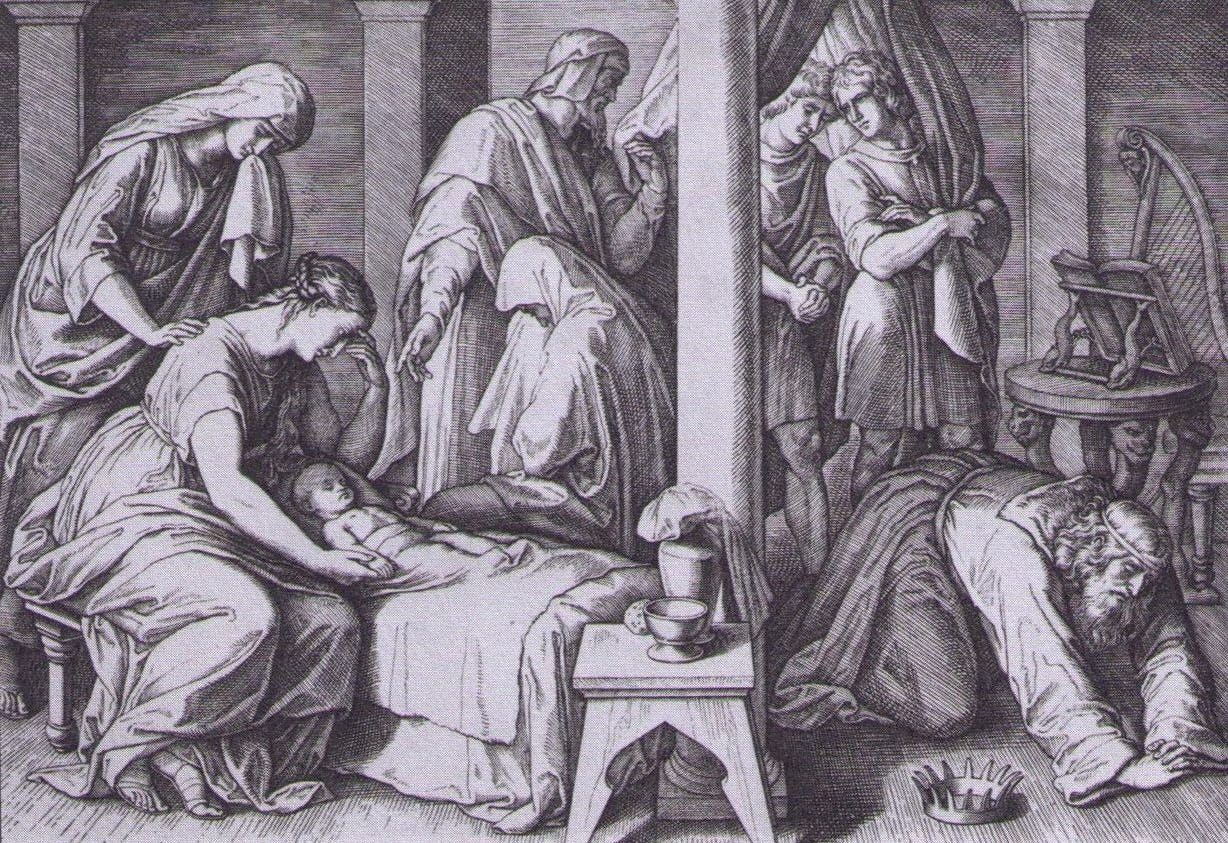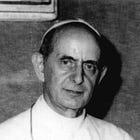'Paul VI's rite of episcopal consecration is invalid'—Abbé Henri Mouraux
Archbishop Marcel Lefebvre's friend and collaborator Abbé Mouraux examines the famous phrase 'governing spirit' and considers its impact on the validity of the new rite of episcopal consecration.

Editors’ Notes—Final Part of this series
Abbé Henri Mouraux and Archbishop Marcel Lefebvre
As we have mentioned a few times now…
Abbé Henri Mouraux was a longtime friend and collaborator with Archbishop Marcel Lefebvre. In the sermon for Mouraux’s golden anniversary of his priestly ordination, Lefebvre praised his faith and faithfulness, boldness and courage, and his refusal to cower under accusations of “disobedience.”
But what might surprise some is that Mouraux openly held that the post-conciliar claimants to the papacy were not true popes.
Mouraux was responsible for the bulletin Bonum Certamen, in which he advanced controversial theses, such as the invalidity or doubtfulness of the new rites of Holy Orders.
We have already translated Bonum Certamen No. 58 and No. 59 (1981), in which he critiqued the new rites of priestly ordination and of episcopal consecration.
Mouraux returned to the issue in 1991, addressing the matter again in two parts and in greater depth. We have already translated No. 118 in which he returns to the issue of the new rite of priestly ordination. In this edition (No. 119), he returns to the new rite of episcopal consecration.
This is the final part of this four-part series about Abbé Mouraux’s treatment of the new rites of holy orders.
Mouraux’s treatment of the new rite of episcopal consecration
In this 1991 article, several years before Fr Anthony Cekada’s famous study in 2006, Abbé Mouraux considered the meaning and implications of the phrase “spiritum principalem” and the change of the sacramental form.
He also considers…
How the traditional rite of episcopal consecration presumed that the consecrand was already a priest, receiving the fulness of this priesthood
How the new rite of episcopal consecration contains no such ideas, and instead is appointing a “chosen” man to a new role or function—which he sees as another similarity with the controversy over Anglican orders
How the new rite is based primarily on a reconstruction of a Pontifical written by St Hippolytus, who had been an schismatic anti-pope (even if he did later died as a true martyr)
How the crass, heretical and anti-sacerdotal expressions of men using the new rite of episcopal consecration (and priestly ordination) strongly suggest that the substitution of the traditional rites was based on a rejection of the Church’s traditional rites and theology.
This latter point is important for the reasons explained in the controversy around Anglican Orders, and summarised by St Thomas Aquinas. St Thomas discussed changes to the sacramental rites, and said:
“Wherefore if he intends by such addition or suppression to perform a rite other from that which is recognized by the Church, it seems that the sacrament is invalid: because he seems not to intend to do what the Church does.”1
Without such an intention—or in the presence of a contrary intention manifested by an intention change of rites—the “sacrament” is invalid.
For this reason, Mouraux also argues elsewhere that the new rites create the same “defect of intention” which Pope Leo XIII noted in Apostolicae Curae, regarding Anglican orders. The similarities between Paul VI’s new rite of priestly ordination and the Anglican ordination rite formed the main focus of Mouraux’s critique in the previous piece.
The state of the question
As with the previous pieces, we are presenting this text solely for its historical interest, in that it shows the sorts of arguments current in the 1980s, amongst those with warm relations with groups like the SSPX.
The WM Review has refrained from arguing for a hard conclusion of invalidity of the new and reformed/deformed rites.
Nonetheless, one does not have to accept arguments for invalidity personally and fully in order to acknowledge that they give rise to a reasonable and prudent doubt about the rite of priestly ordination itself, and every single use of it. This is especially so given the number of different arguments converging on this conclusion.
This doubt is, in fact, not resolvable by studies or investigations: it is only resolvable by conditional repetition of the sacraments in question. As such this route of conditional repetition has frequently been followed by traditional groups since Vatican II.
This is justifiable on theological, practical and pastoral grounds. It is also justified on “customary” or “traditional” grounds, in that so many men involved in the traditionalist response to Vatican II—including Archbishop Lefebvre, Bishop Tissier de Mallerais, Fr Álvaro Calderón and many more—have held to these conclusions.
This route of conditional ordination is also justifiable on the grounds of natural justice: it would place those many men in an inescapable difficulty of conscience to impose a conclusion of validity upon them, even solely in practice. This is especially important, because even if one personally believes that the arguments have been refuted, it is the role of the Church alone to resolve such evidently open questions for all, and not that of private scholars or superiors of congregations.
Following this article, there is our usual reassurance for individuals ordained in these new rites, or who might be troubled by the ideas expressed.
‘Paul VI’s Ordinal is Invalid’
Study of the Episcopate
Bonum Certamen, No. 1189, Jan-Feb 1991
Part B—Study of the Episcopate
Translated by The WM Review, with additional line breaks for ease of reading.
Truth of the Faith
The Council of Trent teaches that the priesthood is a single sacrament, which is realised in two states:
One plenary—the episcopate
The other restricted—the priesthood
In the first part of this study, it became clear that the Catholic faith, as explained by Leo XIII, affirms that the ordination of a priest performed with this Ordinal is invalid.
But what of the consecration of a bishop?
Modification of the form
The Church, let us repeat, holds the power to modify the terms of the form of a sacrament, including the episcopate.
However, she must not do this except for the gravest reasons, and for the welfare of the Church which demands it. When a pope before Paul VI altered the form of a sacrament, he would give an account of his reasoning. In contrast, Paul VI, without offering any explanation, fabricated a new form for the episcopate, retaining only the conjunction et (“and”) from the ancestral form.
Here is the form removed by Paul VI’s Ordinal:
“Comple in sacerdote tuo ministerii tui summam, et ornamentis totius glorificationis instructum, caelestis unguenti rore sanctifica”
Complete within this priest the fullness of your ministry; and adorned with the ornaments of highest honour, sanctify him by the dew of heavenly anointing).
No doubt exists regarding the validity of this formula, which asserts, first, that the candidate for the episcopate is a priest (which is not the case if he was ordained with the Ordinal of Paul VI); second, that he will receive the fullness of the priesthood (“ministerii tui summam”), and finally, the fullness of grace (“cælestis unguenti rore”).
Alignment with the Anglican Ordinal
In place of this eminently Catholic text, Paul VI substituted a form with an Anglican appearance, which is alien to the fullness of the priesthood. It reads as follows:
“Et nunc effunde in hunc electum eam virtutem quae a te est, spiritum principalem, quem dedisti dilecto Filio tuo, Iesu Christo, quem ipse donavit sanctis apostolis qui constituerunt Ecclesiam per singula loca, ut sanctuarium tuum in gloriam et laudem indeficientem nominis tui”
(And now pour out upon this chosen one that power which is from you, the governing spirit, which you gave to your beloved Son, Jesus Christ, and which He Himself bestowed upon the holy apostles who established the Church in each place as your sanctuary, for the unending glory and praise of your name).
[NB: Mouraux translates “spiritum principalem” as “the spirit proper to persons who command.”]
For those who understand such texts, this concerns a “chosen one,” (“elu”), thus not explicitly a priest, to whom the rite will give not the fullness of the priesthood, but rather the “spirit of a leader,” (or “governing spirit,”) which is “proper to those who command.”
Thus, this formula does not refer to the Holy Ghost. The proof: Paul VI borrowed the term spiritum principalem (“spirit of a leader”) from the vocabulary of the Roman army. This “spirit” was intended to be that of the chief in the front line of battle. What place has such an interloper in a sacrament?
It may be said, however, that in Psalm 50.14, we find this expression, “spiritu principali”. Certainly, but the sense given to it in this part of Scripture is hardly suitable for the “spirit” that a Catholic bishop must possess according to Saint Paul.
In effect, in Psalm 50, David expresses his anguish for having committed murder to fulfil his adulterous passion. Therefore, commentators on spiritu principali translate it as “the noble spirit of a prince who avoids falling into crime.” In some Hebrew texts, it means “mastery of himself” (self-control); in others, “the spirit of hegemony.”
Ultimately, Paul VI asks for the future “chosen one” to possess mastery of his passions. This is commendable, yet such a prayer belongs to all baptised, and it certainly does not signify the grace of the episcopate.
Conversely, in its etymological and historical sense, the expression “spiritu principali” is perfectly suited to Anglican bishops, who are primarily functionaries appointed by the king and revocable by him alone. They are not regarded as possessing a power of order superior to that of a mere priest. They are, rather, the living embodiment of the term episkopos, etymologically “overseer,” and under the eye of the political authority at that.
Thus, Paul VI equates the Catholic bishop with the false Anglican bishop.
This is a members-only post for those who support us with monthly or annual subscriptions.
Our work takes a lot of time and energy. Please consider subscribing if you like it.
Here’s why you should take out a membership of The WM Review today:
Help us continue building the case for a restrained, theological approach to the crisis in the Church
Eclectic and sometimes eccentric variety of content
Provide FREE membership to clergy/seminarians (subscribe and reply to the email if this applies to you.)
A small monthly membership really helps us keep The WM Review going. Can you chip in today?
In the meantime, you might enjoy this:



